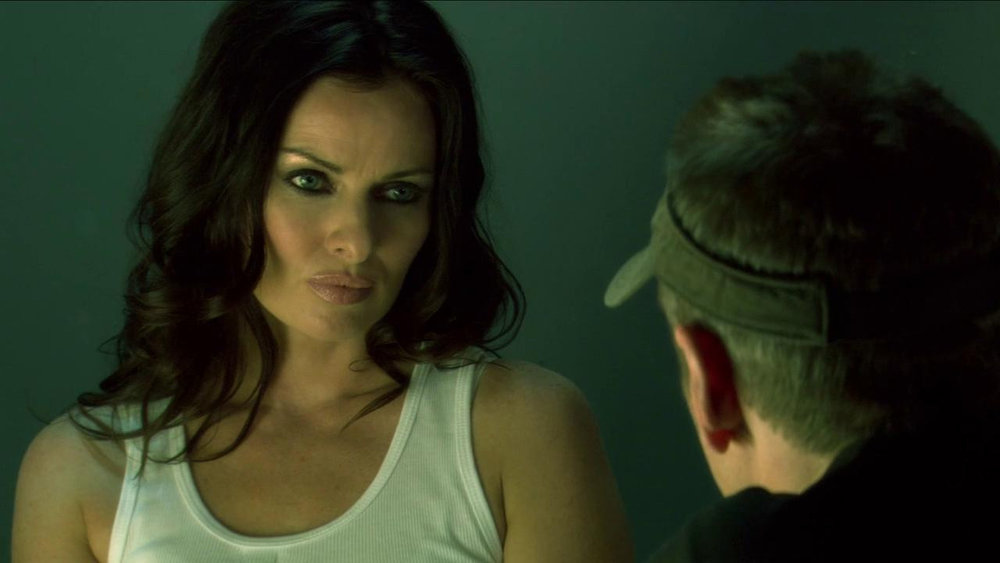
Nothing Gold Can Be Remade
There's no such thing as a movie I refuse to see. Sure, some might rank in the high-hundred-thousands on my priority list, but I've always felt that every picture deserves a fair shake and a watch--eventually. Having said that, the 2008 remake of The Day the Earth Stood Still is so far near the bottom that I might as well forget about it entirely. I mean, honestly, how does one replace Michael Rennie with Keanu Reeves?
But, there I go again, judging.
When Netflix brought The Day the Earth Stopped to my attention by suggesting I might like it, I knew right away that I was dealing with another movie from The Asylum. For newcomers, The Asylum is a consortium of cinematic elves who watch mega-blockbusters and then rush quadruple-Z-grade, direct-to-video knock-offs into production. The best ones involve actor/writer/director Shane Van Dyke in some capacity, a man so sincere and yet so incapable of realizing any kind of creative greatness that he's become, to me, Ed Wood for Generation DIY. In this case, he's the co-writer of a Xerox of a remake of a sci-fi classic; how could I not watch?
The joke's on me, kids. Unlike Titanic 2 or Transmorphers: Fall of Man, The Day the Earth Stopped is not on par with the laugh-a-minute awfulness that The Asylum is famous for. The class-project special effects are there, as are the awful, secondary cast members. We still get a healthy dose of past-their-meager-primes 80s film stars and an end-of-civilization story in which the civilization boasts about twelve people. But the bad dialogue, cheesy sets and awkward performances aren't quite bad enough to be funny; much of Day is just dull.
If you've seen The Day the Earth Stood Still, you know that the premise involves an alien ambassador landing on our planet, with a menacing robot in tow. The visitor, who looks like a man, warns us that we need to change our war-mongering ways so as to not become a threat to the universe. In a magnificent display of power, he halts all electrical activity on the planet, while his metal companion melts army canons with its single, fiery eye. The Asylum's imitation covers much the same ground, though to avoid the easiest lawsuit in history, writers Shane Van Dyke (yes!), Carey Van Dyke, and Darren Dalton send two humanoids and an army of 45 towering Autobot rejects to stand point across the globe.
In an interesting spin on the Noah's Ark mythology, the aliens' mission is to find one virtuous human who can explain to them why people are worth saving. The stoic Man (Bug Hall) chats up clueless military personnel while his swimsuit-model companion Sky (Sinead McCafferty) runs around Los Angeles with an AWOL army guard named Josh (C. Thomas Howell, who also directed the film). They're pursued by Josh's former superior officer, Prewitt (Dalton) and his Washington liaison, Sam (Cameron Bender). While dodging bullets and avoiding rioters (of whom we see exactly one), Sky and Josh manage to deliver a baby and bring a woman back to life.
For the first forty minutes, the only remarkable things about The Day the Earth Stopped are McCafferty's porn-star line-delivery and the wild possibilities of a second- and third-tier-Brat-Pack reunion (in addition to The Outsiders stars Howell and Dalton, Judd Nelson also pops up). But somewhere in the middle of act two, the unthinkable happens: this Asylum disaster becomes rather good.
When the focus shifts from towering robots and lab-coat-wearing extras staring concernedly at computer screens, and centers on the relationships between Josh and Sky and Man and Prewitt, the story transcends its low-rent roots and scratches the surface of substance. Hall, in particular, is great as the detached alien messenger; his boyish looks betray the centuries of wisdom behind his eyes and in his words, and he stands out as Day's single great actor (every Asylum movie I've seen features one solid performance--usually given by an actor named "Bruce").
Howell, in his frustrated, manic state, poses a challenge to the audience: Given four hours to save the planet, could you convince a sentient weapon to spare your species? Maybe it's not the deepest twenty-five minutes you'll see in a movie this year, but Day's middle section gets points for poignancy.
This brings up another brain-teaser: At what point do we give a terrible movie credit for not sucking all the way through? I can't, in good conscience, recommend this film to anyone. But why is that? Am I afraid to admit to being moved by an actress whose range is somewhere between "Eagle Man commercial" and "Speak 'n Spell"? Would such a thing ban me from the critics' club?
It's not like the movie suddenly hits a high note and maintains it through the end; the last ten minutes of this turkey are even worse than the beginning, with cheap-looking robots blowing things up and then returning to their home planet (or whatever it is). During the climax, I couldn't tell if Dalton, Howell and McCafferty were phoning in their performances or swinging for the fences, and the hackneyed mush just about erased any good-will I'd afforded the movie only moments before.
Having said all that, I probably enjoyed The Day the Earth Stopped much more than I would have the remake of The Day the Earth Stood Still. The Asylum's movies are many things, but "predictable" is not one of them; and I think they offer a nice alternative for people who prefer their cheap thrills dirt cheap, and who like to get in and out of a story in about eighty minutes. Day lacks the brains and creativity of the original, but the two films do share a big, beating heart. Sometimes, that's enough.

